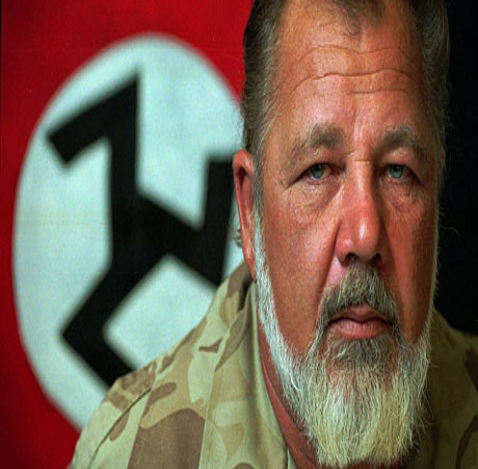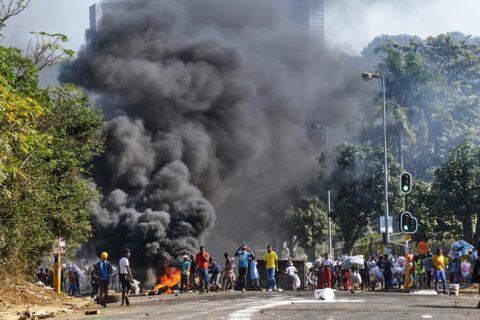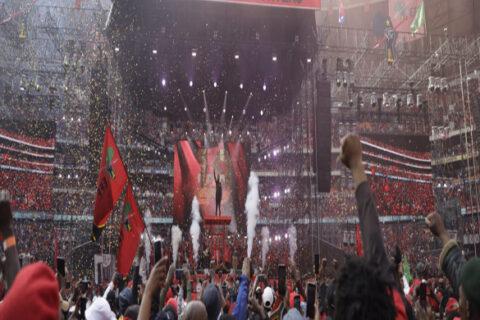One popular mainstay of dissident discussion and sympathy is the topic of the Boers of South Africa. Utilized as the canary in the coal mine foretelling the slow genocide, or at least ethnocide, of the various Caucasian ethnics across the West, the Boers garner much attention among such aforementioned dissident circles, with even the “Farm Murders” being mentioned once by Tucker Carlson. With such well known troubles facing this small minority of Whites in South Africa, the situation certainly requires deeper inspection. However, no people, regardless of the horrors they face, are without mistakes. The purpose here is to analyze the Boers’ fall from grace and end of apartheid, as well as, provide an objective, outside view of their own faults surrounding the unfolding of those events.
Boasting a history in South Africa stretching back to the 1600s and having faced considerable atrocities at the hands of the British during the 19th and early 20th centuries, that period of Boer history will not be the focus here. Rather, the focus is on what took place following the Boers’ rise to power with the National Party in 1948. The party would not take long to begin passing numerous pieces of apartheid legislation, in addition to its constant pushes and support for holding a referendum to secede from the British Empire. It is worth noting apartheid simply built upon a system which had already been established by the British crown prior to 1948. The National Party would ultimately be successful in its bid for a referendum and just barely managed to break away from Britain in 1961 with 52% of voters supporting an independent South Africa republic.
A divisive party from its beginning, the National Party would consolidate the vast majority of the Afrikaner vote by the 1970s. The party’s downfall would begin with Prime Minister Pieter Willem Botha. His liberal reforms caused a fractioning of the NP throughout the 1980s, driving many of the more conservative members into the hands of numerous other rightwing groups. This would cement the growth of the Conservative Party of the time. The Conservative Party grew so quickly it would receive 31.5% of the House of Assembly vote in 1989. Ultimately, the resistance to reform succeeded in little. Botha’s reforms and his successor Frederick Willem de Klerk’s legalization of and capitulation to the communistic African National Congress led to the referendum of 1992 and the first post-apartheid elections in 1994, sealing the fate of apartheid, South African politics, and the Boers.
Following apartheid, South Africa quickly fell into ruin and wanton violent crime. Nelson Mandela’s presidency, lasting from 1994 to 1999, would usher in the current state of chaos in the country. With a new constitution ratified in 1996, severe weakening of the criminal justice system, and abolition of the death penalty in 1995, the crime rate skyrocketed throughout the 1990s and continues to remain high. In 1994, the murder rate in South Africa was 45 per 100,000. By 1999, it had risen to 121 per 100,000. That is quite a staggering number on par with that of Latin American countries. Mandela would also encourage South Africans to embrace the illegal immigrants flooding the country, an unpopular move on his part and one which certainly contributed to crime increases. Its murders have continued to remain among the highest on the world stage well into 2021, alongside its astronomically high rape rates.
Exacerbating the problem further, the Firearms Control Act of 2000, and its further amendments, severely restricted gun ownership in South Africa, requiring numerous licenses for different functions and firearm types which must be applied for, competency tests, and even a police inspection of the applicants’ premises. Additionally, the ANC government, since its initial rise to power, has been rife with corruption, even to the extreme that Nelson Mandela himself was criticized for not combatting it. Affirmative Action spending after apartheid’s end would lead to an increase in taxes, which alongside the increasing crime, caused a mass exodus of thousands of Whites from South Africa not long after the ANC’s takeover. As it stands, South Africa is not in a good position for many from a quality of life perspective, and the Boers, facing relentless criticism and discrimination from post-apartheid society, tend to suffer the most with little political representation on the local or world stage.
Though justifiable in founding the National Party and seceding from the British Crown, the Boers made several mistakes along the way, mistakes which carried dire consequences in the long term. The first mistake to address is the actions of the various rightwing organizations and parties of the time. The Afrikaner Beerstandsbeweging, often referred to as the AWB, stood as the largest and foremost of these organizations. Successful in its mission to organize Afrikaners against the growing anti-apartheid position of the government, the movement’s greatest weakness was turning Eugene Terre’blanche into a cult of personality. Until the late 1980s, Terre’blanche was surrounded by high tier, competent men, normally of Christian background, who did well in organizing the group and keeping finances in order. In 1988, Eugene was involved in a sexual scandal with news journalist Jani Allen; this, along with his noted alcoholism and multiple reports of philandering with other members’ wives, led to a fracturing of the AWB. Many men in leadership positions left and recruitment slowed, but the group did regain an uptick in membership by 1990.

Policy wise, the AWB was fairly sound. Many of its policies were relatively unnoteworthy, but the organization famously called for a Boerestaat/Volkstaat, which means “Boer state”/”people’s state” respectively. Their ultimate desire was to reestablish the famed Boer republics of old, encompassing the Transvaal, Orange Free State, and Northern Natal. Simply stated, this was a pipe dream of the greatest magnitude. Afrikaners comprised a pathetically small percentage of the population, holding only 20% of the makeup in 1960 and 11% in 1996. Plus, the government of the country was concentrated in the former Boer republics, adding further complications to the matter, and most Whites were concentrated around Cape Town and Pretoria. The wise decision would have been to request land in the sparsely populated western provinces, establishing a uniquely Boer bantustan. This move would have quelled much of the backlash against integrationist moves and allowed for a more amicable approach to ending de facto apartheid. Even if the AWB had been successful in reclaiming the republics, not every Afrikaner would have moved there, and it would have been difficult for them to relocate all of the blacks on the land anyway. The Afrikaners had grown used to most of the manual labor being taken over by the blacks, and even the apartheid government was largely unsuccessful in relocating the blacks to the existing bantustans already.
From a Southern Nationalist perspective, the desire among the Boers for their own homeland induces sympathy. However, the Boers simply lacked the means to make such a dream come to fruition. Many had simply forgotten how to do blue collar labor and relied heavily on blacks for such things. It was simply asinine to request land in the political epicenter with the largest negro percentages in the country, outside of Natal. Correlating with these facts, Afrikaners long had strained relations with blacks. Deep Southerners, though maligned in America as the most racist people in the USA, held fairly amicable relations with negroes until the 1960s. Afrikaners and African blacks had such relations and were far more divided than White and black Southerners ever were.
Additional issues afflicting the situation occurred between the Conservative Party, the official opposition to the NP, and the rightwing organizations across the country. At no point did the party ever officially endorse the AWB, against all odds. Desperate for voters so as to grow as the official opposition, endorsing the AWB could have spiked its numbers, especially among the most disaffected of Afrikaners. The AWB, which at its peak boasted hundreds of thousands of supporters, could have leveraged serious voter support to the party. The party claimed it refused to formally endorse the group due to the latter’s refusal to openly condemn violence among its ranks, a mistake on the AWB’s part. The CP, even at its strongest in the 1989 elections, amounted to nothing more than wasted potential by apartheid’s end in 1994, effectively a wet fart in the end. No other rightwing organizations are worth mentioning and had no effect on anything of great importance. It must lastly be stated that even with the vast potential of the AWB, the CP, and the vast commando system, no serious resistance was ever carried out against the end of the apartheid regime other than a bit of hopeful boasting.
Alongside the political sphere, Boers more or less cut off their nose to spite their face, in terms of public policies. Separating from the British crown cut off a steady flow White immigration from England, but the negative reputation of the country eschewed immigration from much of the rest of the world. The Boers did little to promote White immigration from elsewhere to offset this. This cessation in White immigration negatively effected the demographics of other African countries, a move Ian Smith lamented and put Rhodesia in a difficult position when trying to stave off communists during the Bush War. Furthering the demographics issue, the South African government did nothing to promote Afrikaners to bear more children. Add to this the public relations disaster of apartheid itself. This domestic, race-based policy was so extreme it could make even the most ardent Southern segregationist shudder. Boers put themselves in a scenario where they could not have possibly succeeded in the long term and is testament to their lack of foresight upon leaving the British commonwealth.
Foreign policies were mired in mishaps. South Africa infamously embroiled itself in the disastrous Border War. This war was more or less their version of Vietnam. Meant to supposedly defeat the communist hoards taking over Southwest Africa, now Namibia, the Border War spanned from 1966 to 1990 and accomplished absolutely nothing other than social unrest and a massive expansion in the state’s military industrial complex. Furthermore, South Africa did little to aid Ian Smith and Rhodesia during the Bush War of 1964 to 1979. The collapse of the Portuguese Empire led to the communist takeover of Angola and Mozambique, leaving Rhodesia surrounded by hostile populaces everywhere except its southern border. By 1976, South Africa ceased sending Rhodesia munitions and aid and pulled out its troops from the area. Unfortunately, this was done to save face internationally. Once the communist-capitalist Eye of the West turned its gaze toward the Boers, the Soviets in the East already had already initiated hostilities against them. This was a mistake of insurmountable proportions. The Boers had no allies on the world stage at that time other than Rhodesia, and the Rhodesians were the only other country able to back claims it made with military prowess. Regardless, the South Africans sent no more than 5,000 troops to piddle around on the Zambia border, nothing more than an ineffective border patrol.

In the end, South Africa wholly fell to communism and the West in 1994, existing in rapid decline ever since. The contemporary dire straights of the Afrikaner people warrants sympathy; however, their current tribulation is arguably their own fault. With rightwing organizers unable to effect much change, despite large numbers of supporters, due to infighting and malfeasance, no resistance could pose a threat to the communist horizon of 1994, and the Afrikaners as a whole rolled over for the ANC and Nelson Mandela. Furthermore, thousands of Boers fled the country upon apartheid’s collapse, and they continue to do nothing to save themselves. Southerners in Dixie at least resisted the Civil Rights Movement, and Rhodesians engaged in war for its beliefs and independence. Moreover, South Africa turned its back on Rhodesia during the latter’s fight against leftwing revolutionaries, possibly the sole deciding factor of the Bush War’s outcome.
Yes, the current situation the Boers face certainly deserves concern from the outside world, but it cannot be overlooked that they are primarily responsible for allowing it to happen to themselves. The greatest victims of the whole sordid affair and the most worthy of sympathy, having been most in the right, were the Rhodesians.
“The White people of the South are the greatest minority in this nation. They deserve consideration and understanding instead of the persecution of twisted propaganda.” –Strom Thurmond




I could have also mentioned the failed, albeit well crafted, secession plans of the AWB, CP leadership, and the Afrikaner Volksfront in 1994 which fell through due to the AVF’s leader wishing to instead cooperate with the election and found the Freedom Front party. There was also the long campaign of bombings right wingers carried out which did kill innocent people.
I also neglected to mention Terre’blanche’s murder in 2008, the final nail in the coffin for South Africa’s right wing organizing.
2010 not 2008
2010 assassination of TB.
.
a — the AWH club was organized during a community pot-latch.
b — sharing their views, club members organized other informal community pot-latches.
c — the club was invited to offer support to the newly-elected government of Bothaswald, but elements of the deposed dictator ambushed the caravan of cooks and food as well as journalists, killing one journalist while wounding three others.
Seeking treatment at a local clinic, the journalists were dragged away and executed.
d — the communists circulated rumors of a consensual adult relationship with TB and a female journalist; denied by both.
Suing for defamation after the rumors were printed, the courts ruled in their favor, citing prosecutorial misconduct with altered evidence and coerced testimony.
.
The club peaked at around 10,000 core members, with several hundred thousand auxiliary members globally.
Good piece. In The Great Betrayal, Ian Smith pinned the fall of civilization in Africa to the Southern Rhodesian vote in 1928 which saw 2/3 of the people decline to join the RSA. The mistakes you note here would not have occurred, as the mostly British Rhodesians would not have voted for the NP in 1948 (or any other year). I don’t think white rule in Africa would have been any more sustainable due to international pressures, but between the Rhodies, the increased immigration from the Commonwealth, and the anti-communist blacks and coloureds, a much better system could have been forged than the nightmare that is the ANC.
Thank you. Glad you enjoyed it.
This is the truth about South Africa, however, we need a little truth about the New South. An analogous process occurred with the betrayal of the Dixiecrats by Southern leftists forcing Strom Thurmond to migrate to the GOP.
It was the politically retarded White Southern Democrats who voted for leftists like Jimmy Carter and Bill Clinton simply because some lying Jews in their campaigns waived some Confederate battle flags.
Solid read, excellent analysis.
Interesting stuff thanks Joe. In our circles you usually see casual reverence for the NP, but you’ve made a good case here for their mistakes. Learned a lot from this.
I was surprised to read many of them were not able/skilled to perform manual labor. I know it’s tiny but the Orania settlement seems like an effort to remedy these problems; it’s in the west and is totally self-sufficient.
I would love to replicate something similar to Orania here in Dixie. We’ll need it.
Botha and his administration was holding the line against constant attacks from the (traitors) in the West, determined to make SA more self-reliant. I sincerely believe that he was poisoned, or otherwise biologically attacked, to give him a stroke in 1989, so that they could bring that damn traitor, ‘DeJerk’, and destroy White minority rule. How many pieces of silver did it take for DeKlerk to sell his soul, I wonder.
I can’t blame the Boers.Its the Jews and their control of finance/media/diamond gold mines as well as Jewish control of U.S. and Britain that doomed South Africa Whites.Take out the Jew equation and White South Africa would have thrived.Jewish pressure to destroy anything pure White(God’s Holy image)is the sole reason.Why blame the Boers?The English South Africans were most likely to be brainwashed or paid to allow Black rule(but still Jewish rule behind the curtain).I liked the article as I always love reading about S.A. or Rhodesia but I just do not believe that the minor adjustments you mentioned would have changed history.I agree with the Irish Savant who said that the Jews must have otherworld help(read Satanic)to achieve so much damage and its going to take otherworld help(our Heavenly Father)to give the White race a fighting chance.Up to this point it has been rigged and unwinnable for us.We lose every fight.It may well be God’s plan to allow life on Earth to steadily decline or He may give us a great victory,I do not know.Thanks for your efforts,I enjoy your thought provoking work.God bless all here(except hasbara).
I certainly understand the disagreement. My thoughts are not so much that the Boers were solely to blame, but they do share responsibility more so than many in the dissident often claim. Thank you for the feedback.
Great article. I enjoyed the depth and even-handed analysis.
Rebel Roy and Irish Savant are right: the Jews clearly have the help of Lucifer, and he is frankly quite powerful. See also Freemasons for more examples of this.
We need God’s help to shake off these ridiculous shackles and vanquish our enemies.
Gentlemen
It’s not the jews. It’s the Boars who sold out their people to the jews who are at fault.
Up until just before WWII blacks weren’t allowed into the mines in South Africa. The jews/white autocracy sold out the white minors for cheap labor. Within a generation no more whites in the mines.
Lack of racial solidarity influenced the white tribe in the Republic of South Africa and destoryed the nation.